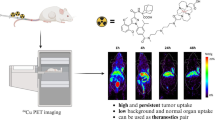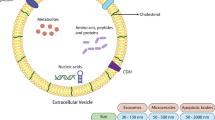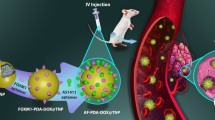Abstract
The immunosuppressive factors in tumor microenvironment enhance tumor growth and suppress anti-tumor immune responses. Adenosine is an important immunosuppressive factor which can be secreted by both tumor and immune cells trough action of two cell surface ecto-nucleotidase molecules CD39 and CD73. Blocking the adenosine generating molecules has emerged as an effective immunotherapeutic approach for treatment of cancer. In this study, CD73-siRNA encapsulated into chitosan-lactate (ChLa) nanoparticles (NPs) was employed to suppress the expression of CD73 molecule on 4T1 breast tumor cells, in vitro. ChLa NPs were generated through ionic gelation of ChLa by tripolyphosphate (TPP). Small interfering RNA (SiRNA)-loaded NPs had about 100 nm size with a polydispersive index below 0.3 and a zeta potential about 13. Our results showed that ChLa NPs with Ch 50 kDa exhibit the best physicochemical features with the high siRNA encapsulation capacity. Synthesized NPs were able to fully bind with siRNA, protect them against serum and heparin degradation, and promote the transfection process. While the NPs exhibited low toxicity during 72 h cell culture, the transfection of Ch-plasmid expressing green fluorescent protein (pEGFP) NPs was efficient in 4T1 cells with a transfection rate of 53.6 % as detected by flow cytometry. In addition, CD73-siRNA-loaded ChLa NPs could efficiently suppress the expression of CD73 as assayed by real-time polymerase chain reaction and flow cytometry. As a conclusion, CD73-siRNA-loaded ChLa NPs may be considered as a promising therapeutic tool for cancer therapy; however, further in vivo investigations are necessary.






Similar content being viewed by others
References
Yousefi M, Movassaghpour AA, Shamsasenjan K, Ghalamfarsa G, Sadreddini S, Jadidi-Niaragh F, et al. The skewed balance between tregs and th17 in chronic lymphocytic leukemia. Future Oncol. 2015;11:1567–82.
Jadidi-Niaragh F, Ghalamfarsa G, Yousefi M, Tabrizi MH, Shokri F. Regulatory t cells in chronic lymphocytic leukemia: implication for immunotherapeutic interventions. Tumor Biol. 2013;34:2031–9.
Jadidi-Niaragh F, Yousefi M, Memarian A, Hojjat-Farsangi M, Khoshnoodi J, Razavi SM, et al. Increased frequency of cd8+ and cd4+ regulatory t cells in chronic lymphocytic leukemia: association with disease progression. Cancer Investig. 2013;31:121–31.
Motallebnezhad M, Jadidi-Niaragh F, Qamsari ES, Bagheri S, Gharibi T, Yousefi M. The immunobiology of myeloid-derived suppressor cells in cancer. Tumor Biol. 2015;1–20.
Yazdani Y, Mohammadnia-Afrouzi M, Yousefi M, Anvari E, Ghalamfarsa G, Hasannia H, et al. Myeloid-derived suppressor cells in b cell malignancies. Tumor Biol. 2015;1–15.
Raggi C, Mousa H, Correnti M, Sica A, Invernizzi P. Cancer stem cells and tumor-associated macrophages: a roadmap for multitargeting strategies. Oncogene. 2015.
Ghalamfarsa G, Hadinia A, Yousefi M, Jadidi-Niaragh F. The role of natural killer t cells in b cell malignancies. Tumor Biol. 2013;34:1349–60.
Jadidi-Niaragh F, Jeddi-Tehrani M, Ansaripour B, Razavi SM, Sharifian RA, Shokri F. Reduced frequency of nkt-like cells in patients with progressive chronic lymphocytic leukemia. Med Oncol. 2012;29:3561–9.
Ding T, Yan F, Cao S, Ren X. Regulatory b cell: new member of immunosuppressive cell club. Hum Immunol. 2015.
Kazemi T, Younesi V, Jadidi-Niaragh F, Yousefi M. Immunotherapeutic approaches for cancer therapy: an updated review. Artificial cells, nanomedicine, and biotechnology. 2015;1–11.
Haji-Fatahaliha M, Hosseini M, Akbarian A, Sadreddini S, Jadidi-Niaragh F, Yousefi M. Car-modified t-cell therapy for cancer: an updated review. Artif Cells Nanomedicine Biotechnol. 2015;1–11.
Young A, Mittal D, Stagg J, Smyth MJ. Targeting cancer-derived adenosine: new therapeutic approaches. Cancer Discov. 2014;4:879–88.
Gao Z-w, Dong K, Zhang H-z: The roles of cd73 in cancer. BioMed Res Int 2014;2014
Zhang B. Cd73: a novel target for cancer immunotherapy. Cancer Res. 2010;70:6407–11.
Hosseini M, Haji-Fatahaliha M, Jadidi-Niaragh F, Majidi J, Yousefi M. The use of nanoparticles as a promising therapeutic approach in cancer immunotherapy. Artif Cells Nanomedicine Biotechnol. 2015;1–11.
Tahamtan A, Tabarraei A, Moradi A, Dinarvand M, Kelishadi M, Ghaemi A, et al. Chitosan nanoparticles as a potential nonviral gene delivery for hpv-16 e7 into mammalian cells. Artif Cells Nanomedicine Biotechnol. 2014;1–7.
Mollarazi E, Jalilian AR, Johari‐daha F, Atyabi F. Development of 153sm-folate-polyethyleneimine-conjugated chitosan nanoparticles for targeted therapy. J Label Compd Radiopharm. 2015;58:327–35.
Talaei F, Azizi E, Dinarvand R, Atyabi F. Thiolated chitosan nanoparticles as a delivery system for antisense therapy: evaluation against egfr in t47d breast cancer cells. Int J Nanomedicine. 2011;6:1963.
Cheung RCF, Ng TB, Wong JH, Chan WY. Chitosan: an update on potential biomedical and pharmaceutical applications. Marine drugs. 2015;13:5156–86.
Molinaro R, Wolfram J, Federico C, Cilurzo F, Di Marzio L, Ventura CA, et al. Polyethylenimine and chitosan carriers for the delivery of rna interference effectors. Expert Opin Drug Del. 2013;10:1653–68.
Shikata F, Tokumitsu H, Ichikawa H, Fukumori Y. In vitro cellular accumulation of gadolinium incorporated into chitosan nanoparticles designed for neutron-capture therapy of cancer. Eur J Pharm Biopharm. 2002;53:57–63.
Thanou M, Florea B, Geldof M, Junginger H, Borchard G. Quaternized chitosan oligomers as novel gene delivery vectors in epithelial cell lines. Biomaterials. 2002;23:153–9.
Corsi K, Chellat F, Yahia LH, Fernandes JC. Mesenchymal stem cells, mg63 and hek293 transfection using chitosan-DNA nanoparticles. Biomaterials. 2003;24:1255–64.
Wan L, Hu F, Yuan H. study of the uptake of chitosan oligosaccharide nanoparticles by a549 cells]. Yao xue xue bao. Acta Pharm Sin. 2004;39:227–31.
Dastan T, Turan K. In vitro characterization and delivery of chitosan-DNA microparticles into mammalian cells. J Pharm Pharm Sci. 2004;7:205–14.
Zhao X, Yu S-B, Wu F-L, Mao Z-B, Yu C-L. Transfection of primary chondrocytes using chitosan-pegfp nanoparticles. J Control Release. 2006;112:223–8.
Weecharangsan W, Opanasopit P, Ngawhirunpat T, Apirakaramwong A, Rojanarata T, Ruktanonchai U, et al. Evaluation of chitosan salts as non-viral gene vectors in cho-k1 cells. Int J Pharm. 2008;348:161–8.
Weecharangsan W, Opanasopit P, Ngawhirunpat T, Rojanarata T, Apirakaramwong A. Chitosan lactate as a nonviral gene delivery vector in cos-1 cells. AAPS PharmSciTech. 2006;7:E74–9.
Moghaddam FA, Atyabi F, Dinarvand R. Preparation and in vitro evaluation of mucoadhesion and permeation enhancement of thiolated chitosan-phema core-shell nanoparticles. Nanomedicine: Nanotechnol, Biol Med. 2009;5:208–15.
Akhlaghi SP, Saremi S, Ostad SN, Dinarvand R, Atyabi F. Discriminated effects of thiolated chitosan-coated pmma paclitaxel-loaded nanoparticles on different normal and cancer cell lines. Nanomedicine: Nanotechnol, Biol Med. 2010;6:689–97.
Takedachi M, Qu D, Ebisuno Y, Oohara H, Joachims ML, McGee ST, et al. Cd73-generated adenosine restricts lymphocyte migration into draining lymph nodes. J Immunol. 2008;180:6288–96.
Yegutkin GG, Marttila‐Ichihara F, Karikoski M, Niemelä J, Laurila JP, Elima K, et al. Altered purinergic signaling in cd73‐deficient mice inhibits tumor progression. Eur J Immunol. 2011;41:1231–41.
Wang L, Fan J, Thompson LF, Zhang Y, Shin T, Curiel TJ, et al. Cd73 has distinct roles in nonhematopoietic and hematopoietic cells to promote tumor growth in mice. J Clin Invest. 2011;121:2371.
Zhi X, Chen S, Zhou P, Shao Z, Wang L, Ou Z, et al. Rna interference of ecto-5′-nucleotidase (cd73) inhibits human breast cancer cell growth and invasion. Clin Exp Metastasis. 2007;24:439–48.
Stagg J, Beavis PA, Divisekera U, Liu MC, Möller A, Darcy PK, et al. Cd73-deficient mice are resistant to carcinogenesis. Cancer Res. 2012;72:2190–6.
Stagg J, Divisekera U, McLaughlin N, Sharkey J, Pommey S, Denoyer D, et al. Anti-cd73 antibody therapy inhibits breast tumor growth and metastasis. Proc Natl Acad Sci. 2010;107:1547–52.
Jin D, Fan J, Wang L, Thompson LF, Liu A, Daniel BJ, et al. Cd73 on tumor cells impairs antitumor t-cell responses: a novel mechanism of tumor-induced immune suppression. Cancer Res. 2010;70:2245–55.
Stagg J, Divisekera U, Duret H, Sparwasser T, Teng MW, Darcy PK, et al. Cd73-deficient mice have increased antitumor immunity and are resistant to experimental metastasis. Cancer Res. 2011;71:2892–900.
Thompson LF, Eltzschig HK, Ibla JC, Van De Wiele CJ, Resta R, Morote-Garcia JC, et al. Crucial role for ecto-5′-nucleotidase (cd73) in vascular leakage during hypoxia. J Exp Med. 2004;200:1395–405.
Wang L, Tang S, Wang Y, Xu S, Yu J, Zhi X, et al. Ecto-5′-nucleotidase (cd73) promotes tumor angiogenesis. Clin Exp Metastasis. 2013;30:671–80.
Forte G, Sorrentino R, Montinaro A, Luciano A, Adcock IM, Maiolino P, et al. Inhibition of cd73 improves b cell-mediated anti-tumor immunity in a mouse model of melanoma. J Immunol. 2012;189:2226–33.
Zhi X, Wang Y, Zhou X, Yu J, Jian R, Tang S, et al. Rnai-mediated cd73 suppression induces apoptosis and cell-cycle arrest in human breast cancer cells. Cancer Sci. 2010;101:2561–9.
Kiang T, Wen J, Lim HW, Leong KW. The effect of the degree of chitosan deacetylation on the efficiency of gene transfection. Biomaterials. 2004;25:5293–301.
Acknowledgments
We would like to thank, Maryam Ajami, Zahra Mirzaie, and Reyhaneh Varshochian for their excellent technical support. This study was supported in part by a grant from Tehran University of Medical Sciences (grant number: 24869).
Author information
Authors and Affiliations
Corresponding authors
Ethics declarations
Conflicts of interest
None
Rights and permissions
About this article
Cite this article
Jadidi-Niaragh, F., Atyabi, F., Rastegari, A. et al. Downregulation of CD73 in 4T1 breast cancer cells through siRNA-loaded chitosan-lactate nanoparticles. Tumor Biol. 37, 8403–8412 (2016). https://doi.org/10.1007/s13277-015-4732-0
Received:
Accepted:
Published:
Issue Date:
DOI: https://doi.org/10.1007/s13277-015-4732-0




